By Leen Randell
Updated: Jul 04, 2024
10 Best Herbal Decoctions For Mucus In Stomach
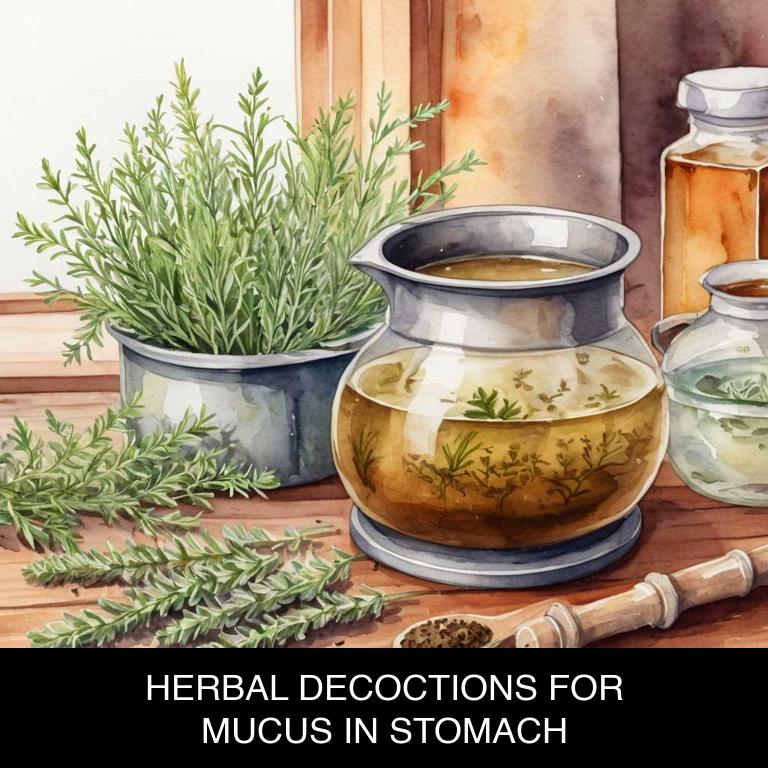
Herbal decoctions for mucus in stomach are a natural remedy that involves brewing herbs to create a liquid extract that helps to alleviate excess mucus production in the stomach.
This is especially helpful for individuals who suffer from digestive issues such as gastritis, gastroesophageal reflux disease (GERD), or irritable bowel syndrome (IBS). Decoctions made with herbs like slippery elm, marshmallow root, and licorice root help to soothe and protect the mucous membranes in the stomach, reducing inflammation and discomfort.
For example, a person experiencing chronic heartburn may find relief by drinking a decoction of slippery elm, allowing them to enjoy meals without discomfort and sleep better at night.
The following article describes in detail the most important decoctions for mucus in stomach, including medicinal properties, parts of herbs to use, and recipes for preparations.
- 1. Glycyrrhiza glabra
- 2. Mentha x piperita
- 3. Taraxacum officinale
- 4. Silybum marianum
- 5. Althaea officinalis
- 6. Urtica dioica
- 7. Symphytum officinale
- 8. Foeniculum vulgare
- 9. Myrrhis odorata
- 10. Matricaria chamomilla
- What is the best combination of herbal decoctions to use for mucus in stomach?
- What ailments similar to mucus in stomach are treated with herbal decoctions?
1. Glycyrrhiza glabra
Licorice decoctions helps with mucus in stomach because of its anti-inflammatory properties, which soothe and calm the mucous membranes lining the digestive tract.
The decoction's glycyrrhizin component also has expectorant qualities, helping to break down and thin out excess mucus, making it easier to expel from the body.
Additionally, licorice root has natural antibacterial properties that can help combat Helicobacter pylori bacteria, a common culprit behind stomach ulcers and inflammation, reducing their ability to produce excess mucus.

Medicinal Constituents
The list below shows the primary medicinal constituents in Glycyrrhiza glabra decoctions that help with mucus in stomach.
- Saponins: Saponins help to reduce inflammation in the stomach and break down mucus by acting as a demulcent and anti-inflammatory agent.
- Glycyrrhizic acid: Glycyrrhizic acid has anti-inflammatory and anti-irritant properties, which help to soothe and protect the stomach lining, reducing mucus production and inflammation.
- Liquiritin: Liquiritin is a flavonoid that has anti-inflammatory and anti-irritant properties, which help to reduce inflammation and mucus production in the stomach, promoting a healthy gut environment.
Parts Used
The list below shows the primary parts of licorice used to make decoctions for mucus in stomach.
- Roots: The roots of Glycyrrhiza glabra are the primary source of glycyrrhizin, a compound that has anti-inflammatory properties and helps reduce mucus production in the stomach.
- Leaves: The leaves of Glycyrrhiza glabra contain flavonoids and saponins that help soothe the digestive system and reduce inflammation, which can help alleviate mucus buildup in the stomach.
- Barks: The barks of Glycyrrhiza glabra contain compounds that help reduce inflammation and relieve digestive issues, making them a useful part for decoctions to relieve mucus in the stomach.
Quick Recipe
The following recipe gives a procedure to make a basic licorice for mucus in stomach.
- Gather 500 grams of glycyrrhiza glabra roots and wash them thoroughly to remove any dirt or debris.
- Chop the roots into small pieces and soak them in 1 liter of cold water for 2 hours.
- Heat the water slowly over low heat for 10 minutes to allow the roots to infuse.
- Strain the decoction through a cheesecloth or a fine-mesh sieve to remove the solids.
- Allow the decoction to cool and store it in a glass container in the refrigerator for up to 3 days.
2. Mentha x piperita
Peppermint decoctions helps with mucus in stomach because of its natural anti-inflammatory properties.
The menthol present in peppermint oil reduces inflammation in the stomach lining, thereby helping to dissolve and flush out excess mucus. Additionally, peppermint's carminative properties help to reduce gas and bloating, further alleviating discomfort associated with excessive mucus production.
By soothing and calming the digestive tract, herbal peppermint decoctions provide relief from stomach issues caused by mucus buildup.
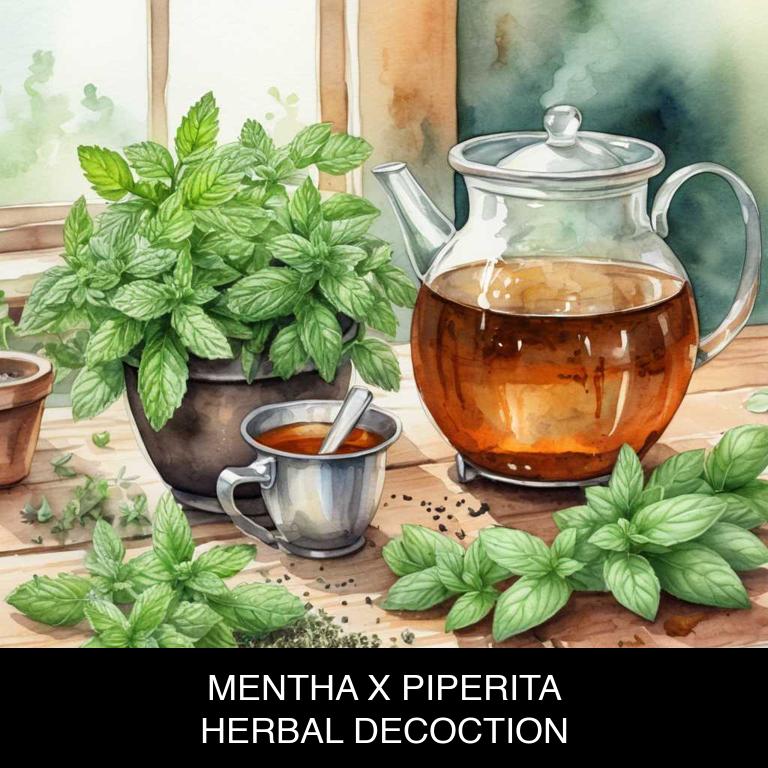
Medicinal Constituents
The list below shows the primary medicinal constituents in Mentha x piperita decoctions that help with mucus in stomach.
- Menthol: Menthol acts as an expectorant, helping to break down and clear mucus from the stomach, thereby alleviating symptoms of nausea, indigestion, and stomach discomfort.
- Menthone: Menthone possesses antispasmodic properties, which help relax the stomach muscles and reduce spasmodic contractions that can contribute to mucus accumulation and stomach pain.
- Rosmarinic acid: Rosmarinic acid has anti-inflammatory and antioxidant properties, which may help reduce inflammation and oxidative stress in the stomach, thereby potentially alleviating symptoms of mucus buildup and stomach discomfort.
Parts Used
The list below shows the primary parts of peppermint used to make decoctions for mucus in stomach.
- Leaves: They are used due to their high concentration of menthol, which helps to break down and expel mucus in the stomach.
- Stems: The stems are used because they contain a significant amount of menthol and other compounds that can help to soothe and calm the digestive system.
- Roots: The roots are used for their ability to stimulate digestion and relieve symptoms of stomach mucus buildup, such as bloating and discomfort.
Quick Recipe
The following recipe gives a procedure to make a basic peppermint for mucus in stomach.
- Harvest fresh or dried mentha x piperita leaves in the morning when they are at their peak potency level.
- Weigh out 1-3 grams of dried leaves or 5-10 grams of fresh leaves for a standard decoction.
- Combine the weighed leaves with 250 milliliters of boiling distilled water in a heat-resistant glass or ceramic pot.
- Reduce heat to a simmer and let the mixture steep for 5-10 minutes allowing flavors to infuse.
- Strain the mixture through a fine mesh sieve or cheesecloth into a clean glass container discard solids.
3. Taraxacum officinale
Dandelion decoctions helps with mucus in stomach because of its natural anti-inflammatory properties that soothe and calm the digestive tract.
The plant's bitter compounds stimulate digestive enzymes, breaking down food more efficiently and reducing congestion in the gut. As a result, it effectively dissolves excess mucus, alleviating symptoms such as bloating, discomfort, and stomach pain associated with mucous buildup.
By promoting healthy digestion, dandelion decoctions help to restore balance to the stomach lining, ultimately clearing out mucus and restoring optimal digestive function.

Medicinal Constituents
The list below shows the primary medicinal constituents in Taraxacum officinale decoctions that help with mucus in stomach.
- Phenolic acids: Help to reduce inflammation and mucous production in the stomach by exerting anti-inflammatory and antioxidant effects.
- Triterpenoid saponins: Assist in reducing mucus production and inflammation in the stomach by binding to and removing excess mucus, as well as inhibiting the production of pro-inflammatory enzymes.
- Taraxasterol: Exerts a soothing effect on the stomach lining, reducing inflammation and mucus production, while also inhibiting the growth of harmful bacteria that can contribute to stomach issues.
Parts Used
The list below shows the primary parts of dandelion used to make decoctions for mucus in stomach.
- Roots: Containing inulin, a prebiotic that can help soothe digestive issues and reduce mucus production.
- Leaves: With their anti-inflammatory properties, the leaves can help alleviate stomach inflammation and reduce mucus production.
- Flowers: Acting as a gentle expectorant, the flowers can help loosen and clear mucus from the stomach, providing relief from digestive discomfort.
Quick Recipe
The following recipe gives a procedure to make a basic dandelion for mucus in stomach.
- Gather taraxacum officinale roots and leaves in a ratio of 1:1 by weight approximately 100 grams total.
- Clean the gathered material by rinsing with cold water and pat drying with a paper towel.
- Chop the dried taraxacum officinale roots and leaves into small pieces roughly 1-2 centimeters in size.
- Boil 500 milliliters of water in a saucepan then add the chopped plant material and simmer for 10-15 minutes.
- Strain the decoction through a cheesecloth or fine mesh into a bowl and discard the solids.
4. Silybum marianum
Milk thistle decoctions helps with mucus in stomach because it contains silymarin, a powerful anti-inflammatory compound that reduces inflammation and soothes irritated tissues in the digestive tract.
The decoction's flavonoids also help to break down mucous plugs and thin out excess mucus, making it easier for the body to expel.
Additionally, milk thistle's bitter properties stimulate digestion and improve gut motility, further aiding in the elimination of mucus and promoting a healthy gut environment.
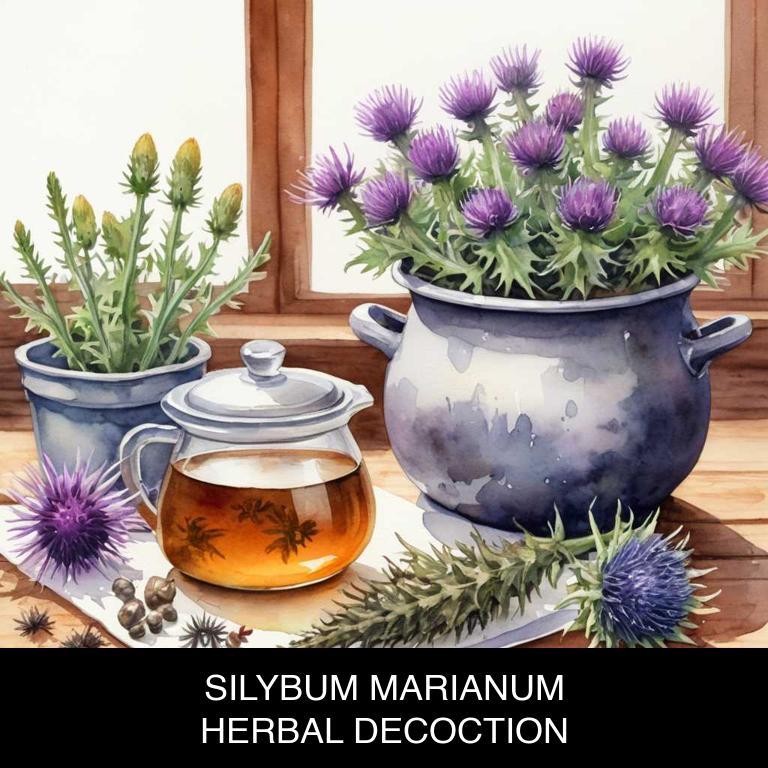
Medicinal Constituents
The list below shows the primary medicinal constituents in Silybum marianum decoctions that help with mucus in stomach.
- Flavonoids: These compounds have anti-inflammatory properties, which can help reduce inflammation in the stomach, thereby decreasing the production of excess mucus.
- Lignans: Lignans, such as silymarin, have antioxidant and anti-inflammatory effects that can help protect the stomach lining from damage and reduce inflammation, thus alleviating mucus buildup.
- Sesquiterpene lactones: These compounds have been shown to have anti-inflammatory and antimicrobial properties, which can help reduce inflammation and kill bacteria that may contribute to excess mucus production in the stomach.
Parts Used
The list below shows the primary parts of milk thistle used to make decoctions for mucus in stomach.
- Seeds: Used to make decoctions for mucus in stomach due to their purported anti-inflammatory and antispasmodic properties.
- Leaves: Used to make decoctions for mucus in stomach due to their potential to reduce inflammation and soothe digestive issues.
- Stems: Used to make decoctions for mucus in stomach due to their possible anti-inflammatory and digestive benefits.
Quick Recipe
The following recipe gives a procedure to make a basic milk thistle for mucus in stomach.
- Harvest 10-20 grams of dried silybum marianum seeds by cutting the stems near the base of the plant.
- Grind the dried silybum marianum seeds into a fine powder using a mortar and pestle for 5 minutes.
- Combine the ground silybum marianum powder with 250 milliliters of boiling water in a heat-resistant container.
- Steep the mixture for 10-15 minutes in a warm place with minimal light and disturbance.
- Strain the decoction through a cheesecloth or a fine-mesh sieve into a clean container to remove solids.
5. Althaea officinalis
Marshmallow decoctions helps with mucus in stomach because of its unique properties that soothe and coat the digestive tract.
The mucilage present in marshmallows forms a protective barrier that helps to trap excess mucus, reducing inflammation and discomfort caused by acid reflux, ulcers, and other gastrointestinal issues. As the decoction is absorbed, it helps to dissolve and dislodge mucus, promoting healthy digestion and alleviating symptoms such as bloating, nausea, and stomach pain.
This natural remedy can provide long-lasting relief for those experiencing digestive discomfort due to excess mucus production.
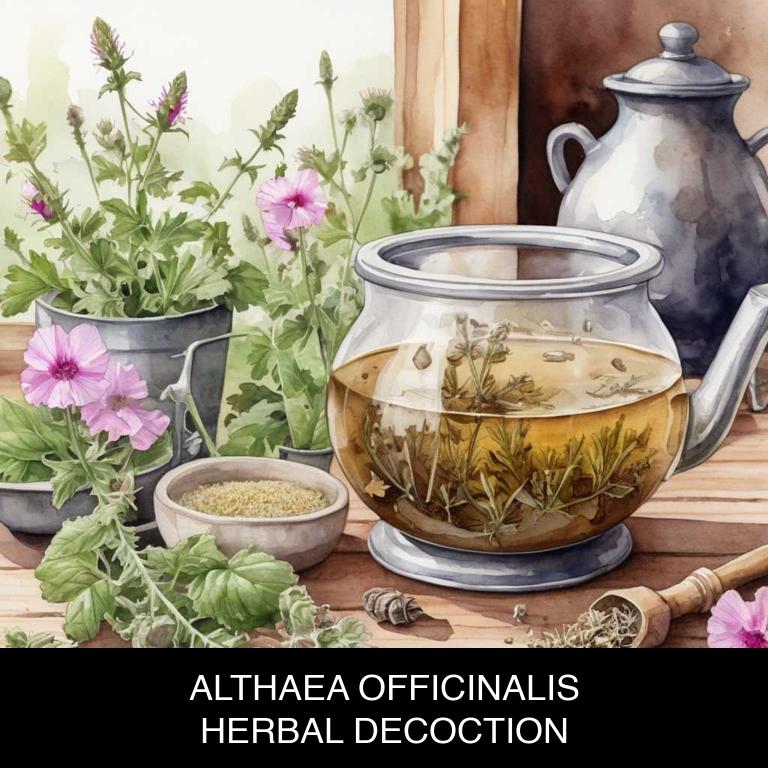
Medicinal Constituents
The list below shows the primary medicinal constituents in Althaea officinalis decoctions that help with mucus in stomach.
- Mucilages: Mucilages, specifically those found in Althaea officinalis, form a protective barrier on the mucous membranes, soothing irritated tissues and reducing inflammation, which can help alleviate mucus-related discomfort in the stomach.
- Polysaccharides: These polysaccharides help to stabilize and protect the mucous membrane, reducing inflammation and promoting the healing of damaged tissues, which can be beneficial in managing mucus-related issues in the stomach.
- Galacturonolactone: Galacturonolactone has been shown to have anti-inflammatory properties and can help to soothe and protect the mucous membranes in the stomach, reducing inflammation and alleviating mucus-related discomfort.
Parts Used
The list below shows the primary parts of marshmallow used to make decoctions for mucus in stomach.
- Roots: The roots are the primary part used due to their high mucilaginous content, which helps soothe and protect the stomach lining.
- Leaves: The leaves are also used, containing similar mucilaginous properties that aid in reducing inflammation and soothing the stomach.
- Stems: The stems of Althaea officinalis are used, although less frequently, as they contain lesser amounts of mucilage compared to the roots and leaves but still contribute to the overall soothing effect.
Quick Recipe
The following recipe gives a procedure to make a basic marshmallow for mucus in stomach.
- Gather 2 to 4 teaspoons of dried root of althaea officinalis for decoction.
- Combine the dried root with 8 ounces of water in a saucepan.
- Boil the mixture for 10 to 15 minutes on medium heat.
- Strain the liquid through a cheesecloth or a fine-mesh sieve into a cup.
- Allow the decoction to cool and drink 2 to 3 cups as needed.
6. Urtica dioica
Stinging nettle decoctions helps with mucus in stomach because of its natural anti-inflammatory and antacid properties.
The decoction's active compounds, such as flavonoids and polyphenols, help to reduce inflammation and soothe the mucous membranes in the stomach, alleviating symptoms of gastric mucosa damage and excessive mucus production. Additionally, stinging nettle has been shown to stimulate digestion and improve gut motility, further aiding in the breakdown and elimination of excess mucus from the stomach.
This natural remedy can provide relief for individuals suffering from stomach discomfort and digestive issues.
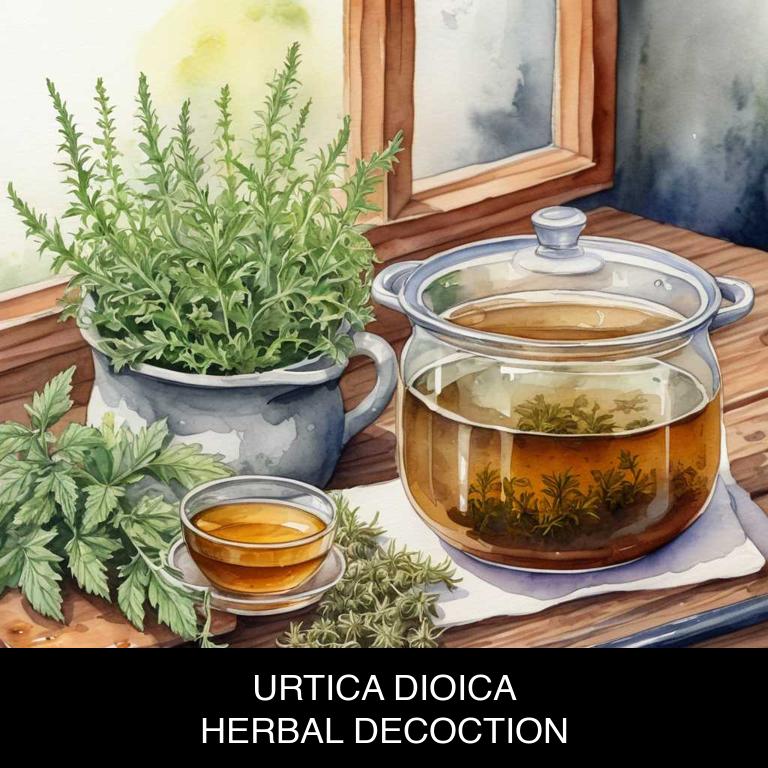
Medicinal Constituents
The list below shows the primary medicinal constituents in Urtica dioica decoctions that help with mucus in stomach.
- Stigmasteryl ferulate: This phenolic compound has anti-inflammatory properties, which can help reduce inflammation and swelling in the stomach, thereby reducing the production of mucus.
- Alkaloids: The alkaloids present in Urtica dioica, such as stachydrine, have a stimulatory effect on digestion and can help in reducing the production of mucus in the stomach by improving the digestive process.
- Quercetin: This flavonoid has anti-inflammatory and antioxidant properties, which can help reduce inflammation and oxidative stress in the stomach, thereby reducing the production of mucus and promoting healthy digestion.
Parts Used
The list below shows the primary parts of stinging nettle used to make decoctions for mucus in stomach.
- Leaves: The leaves are the most commonly used part of Urtica dioica for decoctions due to their high concentration of anti-inflammatory compounds and their traditional use in herbal medicine.
- Roots: The roots of Urtica dioica are used for decoctions due to their high content of saponins, which have been shown to have anti-inflammatory and expectorant properties.
- Stems: The stems of Urtica dioica are used for decoctions due to their rich content of bioactive compounds, including flavonoids and phenolic acids, which have been shown to have anti-inflammatory and antioxidant effects.
Quick Recipe
The following recipe gives a procedure to make a basic stinging nettle for mucus in stomach.
- Harvest a handful of fresh urtica dioica leaves and stems in the early morning when moisture is highest.
- Clean the harvested plant material by gently washing it with cold water to remove dirt and debris.
- Chop 10 grams of the cleaned plant material into small pieces to increase surface area for infusion.
- Combine the chopped plant material with 500 milliliters of boiling water in a heat-resistant container to create a decoction.
- Steep the mixture for 5 to 10 minutes then strain it through a cheesecloth or a fine-mesh sieve.
7. Symphytum officinale
Comfrey decoctions helps with mucus in stomach because it contains a unique combination of bioactive compounds, including allantoin, rosmarinic acid, and mucilages.
These compounds work synergistically to soothe and calm the digestive tract, reducing inflammation and irritation that can lead to excessive mucus production. Additionally, comfrey's mucilages help to emulsify and remove excess mucus from the stomach lining, promoting healthy digestion and relief from discomfort.
As a result, comfrey decoctions have been traditionally used to alleviate symptoms of gastroesophageal reflux disease (GERD) and other digestive disorders characterized by excessive mucus production.
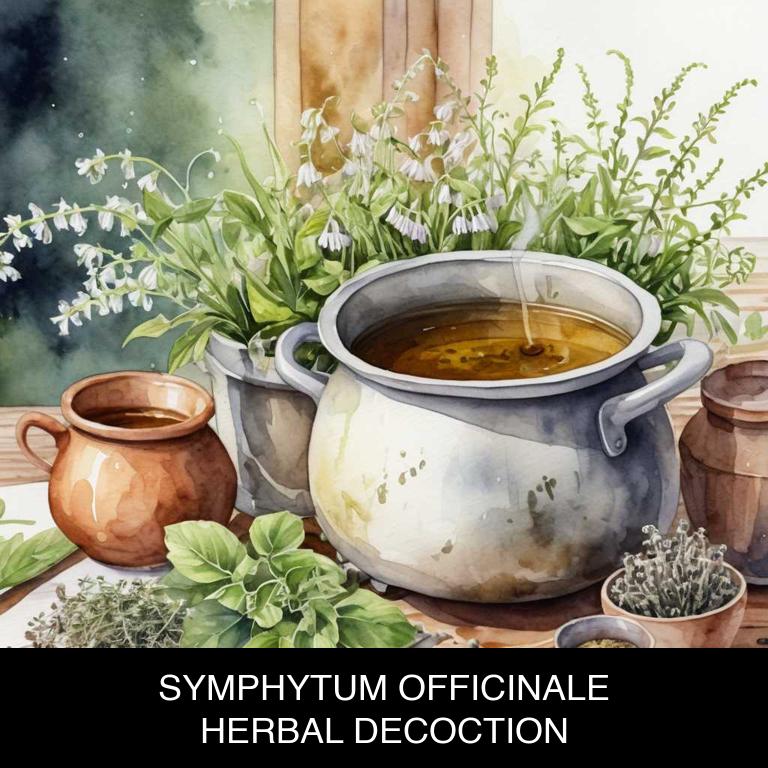
Medicinal Constituents
The list below shows the primary medicinal constituents in Symphytum officinale decoctions that help with mucus in stomach.
- Saponins: Saponins have anti-inflammatory and mucolytic properties, helping to break down and clear mucus in the stomach, reducing inflammation and discomfort.
- Flavonoids: Flavonoids in Symphytum officinale decoctions have antioxidant and anti-inflammatory effects, which can help reduce inflammation in the stomach lining and alleviate symptoms associated with excess mucus.
- Iridoid glycosides: Iridoid glycosides, specifically syringin, have been shown to have mucolytic and anti-inflammatory properties, which can help break down and clear mucus in the stomach, reducing inflammation and discomfort.
Parts Used
The list below shows the primary parts of comfrey used to make decoctions for mucus in stomach.
- Leaves: They are used due to their anti-inflammatory and expectorant properties, which help reduce mucus production and ease digestion.
- Roots: They are used because of their mucilaginous properties, which can help soothe the stomach lining and reduce inflammation.
- Stems: They are used due to their similar mucilaginous properties to the roots, helping to soothe the stomach and reduce mucus production.
Quick Recipe
The following recipe gives a procedure to make a basic comfrey for mucus in stomach.
- Harvest 15-30 grams of fresh roots of symphytum officinale or 30-60 grams of dried roots.
- Chop the roots into small pieces and combine them with 1 liter of cold water in a saucepan.
- Bring the mixture to a boil over high heat and then reduce the heat to medium-low.
- Simmer the decoction for 10-15 minutes or until the liquid has reduced slightly and the flavor has intensified.
- Strain the decoction through a cheesecloth or a fine-mesh sieve into a clean container.
8. Foeniculum vulgare
Fennel decoctions helps with mucus in stomach because its unique composition of volatile oils, such as anethole and fenchone, exhibits mucolytic properties.
These compounds break down excess mucus, relieving digestive discomfort and reducing inflammation in the stomach lining. The soothing and anti-inflammatory effects of fennel also help to calm digestive spasms and cramps, further alleviating symptoms associated with mucus buildup in the stomach.
This natural remedy has been used for centuries to provide relief from bloating, gas, and indigestion caused by excess mucus production.
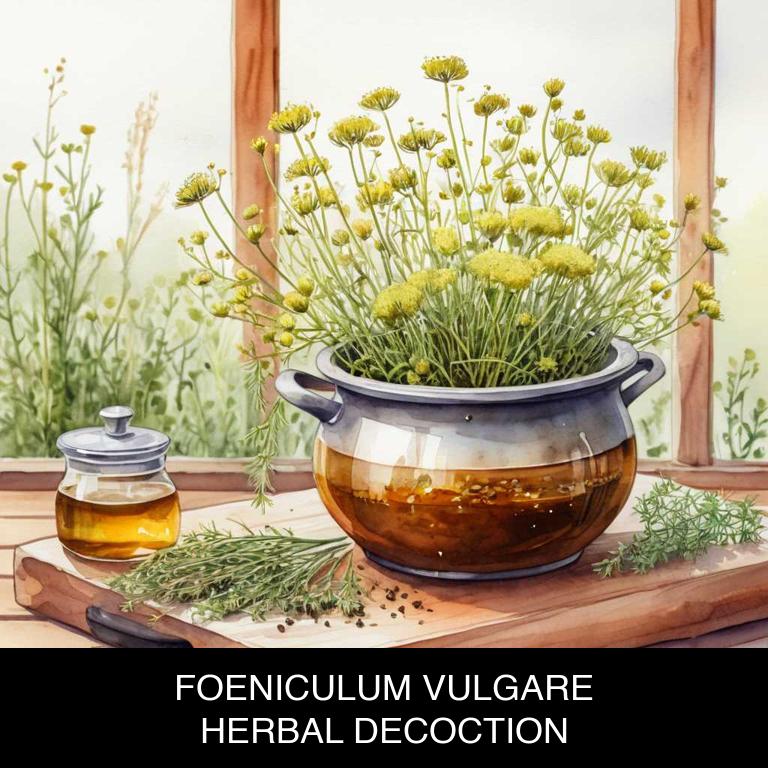
Medicinal Constituents
The list below shows the primary medicinal constituents in Foeniculum vulgare decoctions that help with mucus in stomach.
- Feniculin: It has anti-inflammatory properties, which help to reduce inflammation and alleviate symptoms associated with excessive mucus production in the stomach.
- Anethole: This terpene has carminative properties, which help to relieve gas, bloating, and discomfort associated with excessive mucus in the stomach, promoting digestion and gut health.
- Phenolic acids: They exhibit antioxidant and anti-inflammatory activities, which help to protect the stomach lining from irritation and inflammation caused by excessive mucus production, promoting a healthy gut environment.
Parts Used
The list below shows the primary parts of fennel used to make decoctions for mucus in stomach.
- Seeds: They are used due to their carminative properties, which help to reduce gas and alleviate stomach discomfort.
- Leaves: They are used due to their ability to soothe the digestive system and reduce inflammation in the stomach.
- Roots: They are used due to their bitter properties, which help to stimulate digestion and relieve symptoms of digestive disorders.
Quick Recipe
The following recipe gives a procedure to make a basic fennel for mucus in stomach.
- Collect foeniculum vulgare roots and leaves in equal proportions for a total of 20 grams.
- Chop the collected foeniculum vulgare roots and leaves into fine pieces for easier infusion.
- Combine 10 grams of chopped foeniculum vulgare with 500 milliliters of water in a saucepan.
- Boil the mixture at 212 degrees fahrenheit for 10 minutes then reduce the heat to a simmer.
- Strain the decoction through a cheesecloth into a clean container and discard the solids.
9. Myrrhis odorata
Sweet cicely decoctions helps with mucus in stomach because it contains bioactive compounds that have natural anti-inflammatory and antioxidant properties.
These compounds help to reduce inflammation in the gut lining, which can alleviate symptoms of mucous congestion. Additionally, sweet cicely has been shown to increase the production of digestive enzymes, which can break down excess mucus and aid in its elimination from the body.
By soothing the stomach lining and promoting healthy digestion, sweet cicely decoctions can provide relief for individuals suffering from mucus buildup in the stomach.
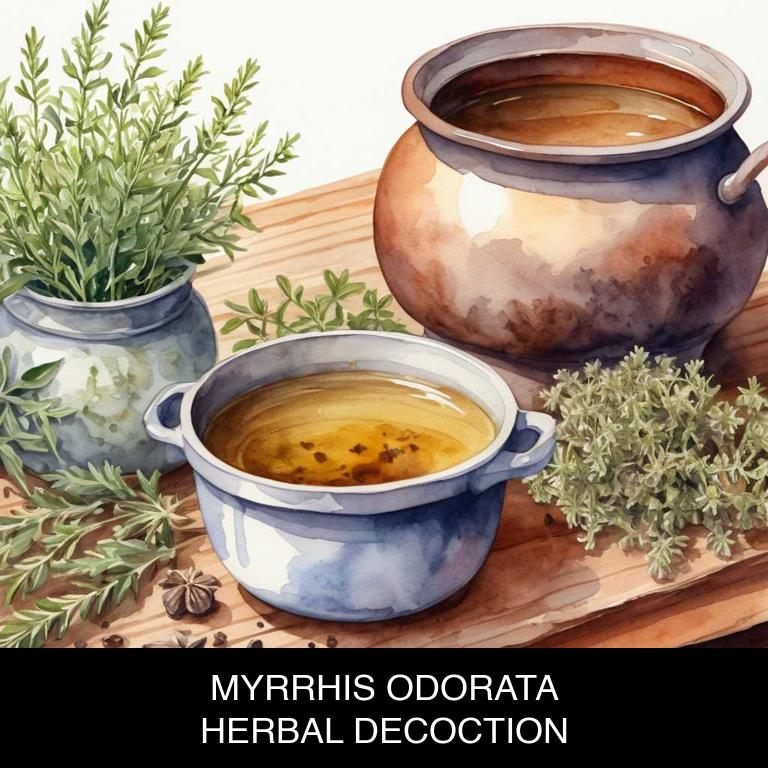
Medicinal Constituents
The list below shows the primary medicinal constituents in Myrrhis odorata decoctions that help with mucus in stomach.
- Bitter glycosides: These compounds help with mucus in stomach by stimulating the digestive system and increasing the production of digestive enzymes, which in turn break down and reduce mucus accumulation.
- Phenolic acids: These compounds possess anti-inflammatory and antioxidant properties, which help reduce inflammation and oxidative stress in the stomach, thereby reducing mucus production and alleviating symptoms of stomach mucus.
- Flavonoids: These compounds have a soothing effect on the stomach lining, reducing inflammation and irritation, which helps to break down and clear out mucus, providing relief from stomach mucus-related discomfort.
Parts Used
The list below shows the primary parts of sweet cicely used to make decoctions for mucus in stomach.
- Roots: They are used due to their antispasmodic and anti-inflammatory properties, which help alleviate stomach discomfort and reduce mucus production.
- Leaves: They are utilized for their expectorant and carminative properties, which facilitate the removal of mucus and gas from the stomach, providing relief.
- Stems: They contain compounds that help reduce inflammation and alleviate stomach cramps, making them a suitable choice for decoctions aimed at reducing mucus in the stomach.
Quick Recipe
The following recipe gives a procedure to make a basic sweet cicely for mucus in stomach.
- Gather the required myrrhis odorata herb in sufficient quantities typically around 10 to 20 grams for the decoction.
- Clean the gathered myrrhis odorata thoroughly to remove any dirt or debris using cold water.
- Chop the cleaned myrrhis odorata into smaller pieces to increase its surface area for better extraction.
- Combine the chopped myrrhis odorata with 500 milliliters of boiling water and let it steep for 5 to 10 minutes.
- Strain the decoction through a cheesecloth or a fine mesh to remove the solid particles from the liquid.
10. Matricaria chamomilla
Chamomile decoctions helps with mucus in stomach because it has natural anti-inflammatory properties that soothe and calm the digestive tract.
The apigenin present in chamomile binds to benzodiazepine receptors in the brain, reducing inflammation and spasms in the stomach lining, which helps to break down and eliminate excess mucus. Additionally, chamomile's antimicrobial properties help to combat underlying infections that may be contributing to excessive mucus production.
By addressing these underlying causes, chamomile decoctions can provide relief from stomach discomfort and promote a healthy digestive system.
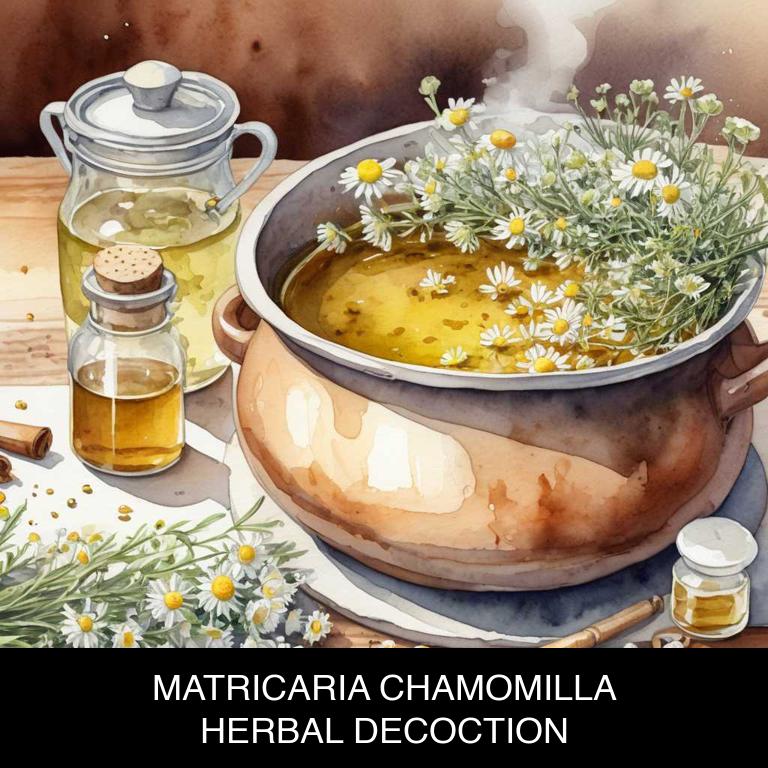
Medicinal Constituents
The list below shows the primary medicinal constituents in Matricaria chamomilla decoctions that help with mucus in stomach.
- Apigenin: A flavonoid that helps reduce inflammation and relax smooth muscle in the stomach, thereby alleviating mucus-related stomach issues.
- Luteolin: A flavonoid that exhibits anti-inflammatory and antioxidant properties, which can help reduce mucus production and alleviate stomach discomfort.
- Α-bisabolol: A sesquiterpene that has anti-inflammatory and soothing effects, which can help reduce stomach inflammation and alleviate mucus-related symptoms such as bloating and discomfort.
Parts Used
The list below shows the primary parts of chamomile used to make decoctions for mucus in stomach.
- Flowers: The flowers are the primary part used due to their high concentration of apigenin and luteolin, which have anti-inflammatory and antispasmodic properties that help soothe the stomach and relieve mucus.
- Leaves: The leaves are also used in decoctions due to their ability to reduce inflammation and ease digestive discomfort caused by excess mucus in the stomach.
- Seeds: The seeds are used in some decoctions for their carminative properties, which help to relieve gas and reduce inflammation in the stomach, thereby alleviating mucus buildup.
Quick Recipe
The following recipe gives a procedure to make a basic chamomile for mucus in stomach.
- Harvest 25-30 dried matricaria chamomilla flowers at dawn when the plant is at its peak potency for medicinal uses.
- Measure out 2 teaspoons of the dried flowers for a standard decoction serving.
- Combine the measured flowers with 1 cup of boiling water in a heat-resistant glass or ceramic container.
- Steep the mixture for 5-7 minutes or until the liquid has reduced by half and the flowers have lost their color.
- Strain the decoction through a cheesecloth or a fine-mesh sieve into a clean container to remove the solids.
What is the best combination of herbal decoctions to use for mucus in stomach?
The best combination of herbal decoctions that help with mucus in stomach is a blend of ginger, licorice root, and slippery elm.
Ginger aids digestion and reduces inflammation, while licorice root soothes the stomach lining and reduces acid production. Slippery elm, rich in mucilages, coats the stomach, reducing inflammation and alleviating discomfort. This trio works synergistically to break down mucus, ease digestive issues, and promote overall stomach health.
Regular consumption of this blend can help alleviate mucus-related stomach problems and promote a healthy gut.
What ailments similar to mucus in stomach are treated with herbal decoctions?
Ailments similar to mucus in stomach that are treated with herbal decoctions are digestive issues such as gastritis, ulcers, and inflammatory bowel disease.
Herbs like slippery elm, marshmallow root, and licorice root help soothe and protect the mucous membranes in the stomach, reducing inflammation and discomfort.
Ginger and turmeric also have anti-inflammatory properties that aid in alleviating symptoms.